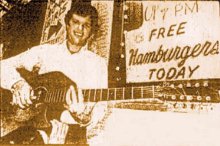Leo Kottke Lays it All on The Liner Notes:
The virtuoso guitarist lives down his own put-down
by Maryann Vollers
 |
New York -- Geese farts have plagued Leo Kottke for most of his recording career. "I'm probably the only guy I know who buried half his career at the beginning because I labeled myself with a quote," says the thirty-three-year-old master of the acoustic guitar. Kottke is talking about the linter notes from a Takoma Records LP, 6 and 12 String Guitar, in which he compared his singing to "the sound of geese farts on a muggy day."
"I was trying to explain why that record was all instrumental. And I liked the line. But I've had to live it down ever since."
Kottke's baritone has matured over the years, but his speaking voice, during lunch in a noisy Italian restaurant in New York, sounds vaguely like a bullfrog mired in oatmeal. He still seems to be recovering from the night before, when he sang his head off to capacity crowds at My Father's Place, a 500-seat club on Long Island. (Otherwise, his face is free of worry lines, perhaps because he leads a quiet life in suburban Minneapolis with his wife and two kids when he's not on the road.)
My Father's Place was the latest stop on a tour to promote Burnt Lips, his second album on Chrysalis Records (Kottke had switched from Takoma to Capitol, for whom he recorded seven LPs, including Ice Water, Greenhouse and My Feet Are Smiling, before signing with Chrysalis).
Leo Kottke has never had a gold album or a hit single -- but that doesn't seem to bother him or his fans, or even his record company, which seems content with his non-astronomical but loyal audience. The self-taught Kottke is a virtuoso who integrates classical, folk, jazz, country, ragtime and bottleneck forms into a unified, distinctive style.
As writer Tom Murtha put it, "Kottke taps the implicit logic of the guitar fingerboard. His unpredictable melodies extract a truth from the instrument every guitarist has always known is there, but has never been able to state."
Kottke usually plays unaccompanied, favoring the full-blown, pure chords he gets with open tunings on his twelve-string custom Martin and Bozo guitars.
"I learned to play guitar when I was eleven," he says. "The first chord I had was an E chord. I played it over and over for two weeks; I'd just strum it and let it ring out. It sent me right out of this world. I'm still like that."
Born in Athens, Georgia, Leo Kottke spent his childhood moving with his family from state to state. ("It's probably why I'm doing what I'm doing now -- being on the road -- because the thing that I liked most was leaving. I was pretty much of a hermit, and I guess I still am.") While Kottke was living in Muskogee, Oklahoma, a cherry bomb that a neighborhood kid had planted in a bush went off in his left ear, leaving his hearing impaired. Later, during a brief stint in the naval reserve, firing practice deafened his right ear. He still has problems hearing some frequencies, he says. "It's had an effect on how I play. That's why I like the twelve-string, 'cause it's down in the bottom and has a fat sound."
After the navy, Kottke went to St. Cloud State College in Minnesota for a few years, kicked around for a while in the mid-Sixties, "hitchhiking and getting robbed," before settling in Minneapolis.
His first LP, Twelve String Blues, on the Oblivion label, was recorded live in 1969 at the Scholar Coffeehouse in Minneapolis. John Fahey heard a demo tape, signed Kottke to his Takoma label and introduced him to Denny Bruce, who has produced most of Kottke's albums and managed him for the past nine years.
The time Kottke spent migrating through the West and Midwest has left a durable stamp on his music. Kottke finds himself attracted to cowboy laments and dirges, like Nick Lowe's "Endless Sleep." Not that Kottke's albums are depressing. "It's not so much grimness as it is regionalism," he explains. "In Wyoming and Oklahoma you've got nothing but flat, burned-out ground and real slow living. It's grim, but it's comforting in a way. There's a charm to it."
Most of Kottke's work reflects this irony, colored with a slightly warped humor. His songs have titles like "Taking a Sandwich to a Feast," "Grim to the Brim" and "When Shrimps Learned to Whistle." He's noted for stage patter involving long, often surreal narratives. And his self-written liner notes are so funny that Grosset and Dunlap has offered him a book contract.
Kottke's music has been reaching a broader audience in some roundabout ways. He composed part of the film soundtrack for Terence Malick's Days of Heaven. His melodies can be heard behind radio sermonettes, farm shows and for a while, his guitar piece "Machine Gun" was used as "thinking music" on the Dating Game ("while one clown decides who to go out with").
Such exposure is not likely to make Kottke a star, though it seems that every journalist who writes about him predicts that pop stardom is just around the corner. But Kottke, who tends to get his points across allegorically, told me this story: Just before bluesman [Mississippi] Fred McDowell died in 1972, Kottke heard him singing at a party. McDowell was in a back room, playing guitar with his eyes closed. He kept going for hours without stopping. "He didn't know I was there and didn't care if anyone was," says Kottke. "And the singing he was doing was as natural as dirt. It felt just right and it satisfied him. He needed it. And that was, at least, a clue."
[The End].